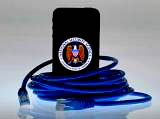 Washington, Mar 12: US' National Security Agency, India's Centre for Development of Telematics, and the UK's GCHQ have been named among the worst online spies by a non-profit group for implementing censorship and surveillance.
Washington, Mar 12: US' National Security Agency, India's Centre for Development of Telematics, and the UK's GCHQ have been named among the worst online spies by a non-profit group for implementing censorship and surveillance.
Three of the government bodies designated by Reporters Without Borders as 'Enemies of the Internet' are located in democracies that have traditionally claimed to respect fundamental freedoms, a report by the Reporters Without Borders said.
Besides these, the report names several government bodies from other countries. These include Pakistan's Telecommunication Authority, North Korea's Central Scientific and Technological Information Agency, Vietnam's Ministry of Information and Communications and China's State Internet Information Office.
"The NSA in the United States, Government Communications Headquarters in the United Kingdom and the Centre for Development of Telematics in India are no better than their Chinese, Russian, Iranian or Bahraini counterparts," it said.
"The NSA and GCHQ have spied on the communications of millions of citizens including many journalists. They have knowingly introduced security flaws into devices and software used to transmit requests on the Internet.
"And they have hacked into the very heart of the Internet using programmes such as the NSA's Quantam Insert and GCHQ's Tempora. The Internet was a collective resource that the NSA and GCHQ turned into a weapon in the service of special interests, in the process flouting freedom of information, freedom of expression and the right to privacy," it said.
This year's "Enemies of the Internet" report, which Reporters Without Borders publishes every year on World Day against Cyber-Censorship, spotlights the government units and agencies that implement online censorship and surveillance.
In its report, it asserted that the Indian government carefully refrained from joining the wave of condemnation that followed Edward Snowden's revelations of the scandalous scale of NSA surveillance. "India had reason for silence," it said.
"The extensive Indian surveillance system has been expanded since the Mumbai attacks in 2008. The Central Monitoring System, developed by the Centre for Development of Telematics, allows the government direct, unlimited and real-time access to a wide variety of electronic communications without relying on internet service providers," Reporters Without Borders said.
The existing Indian laws, it said, give the authorities a free hand to mount major surveillance operations against users of the web and other telecommunication technology.
While one section of the Indian law authorises heavy financial penalties against any individual who refuses to provide any document, return or report to the government; it also authorises the interception of any information transmitted by computer.
Likewise, any person who refuses to decrypt his private information upon official request faces up to seven years in prison, it said.





Comments
Add new comment